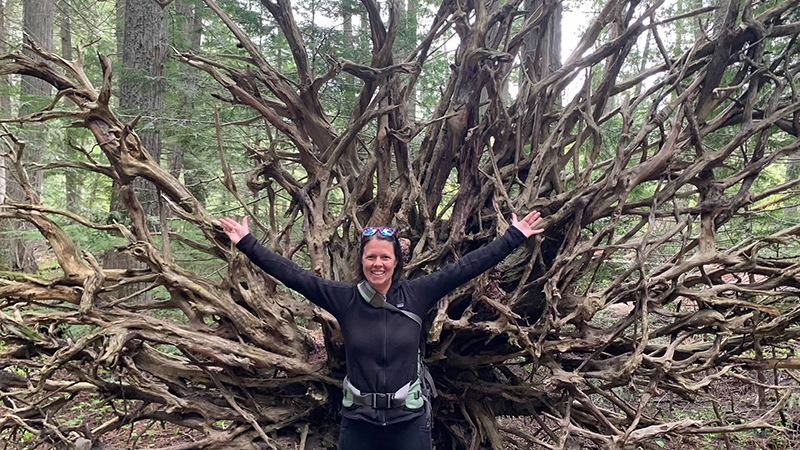Posted: 4/18/2024
Powers reaching new career heights with trees
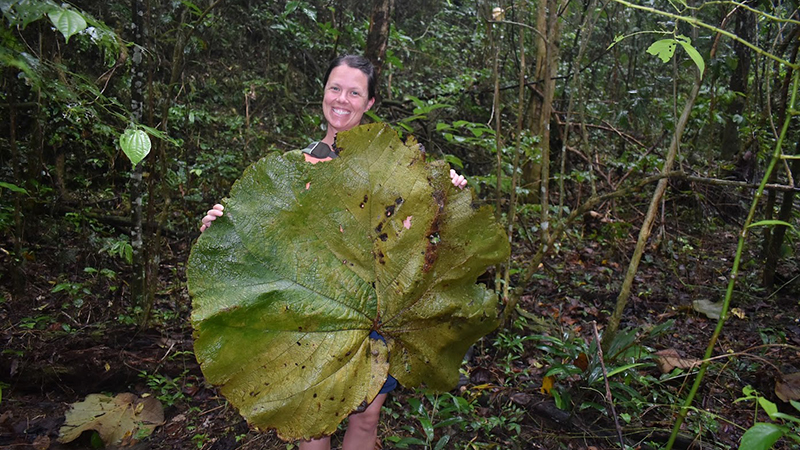
By Ronica Stromberg
Ann Powers has an answer for calculus students who ask, “What will I ever use this for?”
Trees.
The lecturer in Nebraska’s Regional and Community Forestry program visits calculus classrooms at Northeast High School and shows students how arborists use calculus to assign a dollar value to trees. She shows them how they can use trigonometry to calculate the height of a tree, geometry to determine a tree’s diameter, and the formula π·r2 (pi r squared) to determine its area.
Large, mature trees are worth more than scrawny, immature ones. They provide more ecosystem services like helping cool buildings with shade, cleaning air of pollutants, sequestering carbon and lessening flooding by absorbing stormwater.
People may need to assign values to trees, Powers said, when selling or developing forested land, in legals disputes between neighbors over tree damage, or when determining real estate values.
She has visited the high school classrooms a few times since Nebraska hired her as a lecturer in August 2023. In half of her position, she recruits, and in the other half, she teaches three university classes, dendrology, arboriculture and “Introduction to Forest Management."
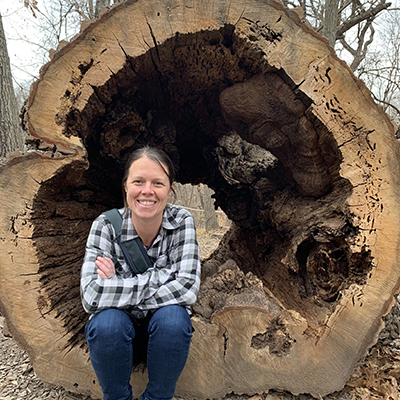
The high school students she seeks to recruit often have not connected calculus with trees.
"They have these a-ha moments, and that's entertaining to me, but it's also the coolest part of being a teacher, that discovery piece, helping them realize something new . . . to them," Powers said.
Even her college students, who have learned about trees in the past, will have these a-ha moments when learning to identify trees and shrubs in dendrology or when studying woody plants and how to grow and manage them in arboriculture.
"One piece of feedback that I get from students, especially in dendrology is—and it just makes me laugh so much— 'Wow! I didn't realize there were so many different kinds of trees!' And I’m only telling them about, like, 100," she said
The students in dendrology are expected to learn the names of 80 trees and 640 characteristics, but they praise the class afterward.
"It's a big ask for students, but the ones who get through it, which is most of them, they end up really having good feedback for me," she said. "I don't know if they have like amnesia about the pain that I put them through, but they always come out and they're like, ‘I love that class!’"
Powers became adept at identifying trees while working at Landscape Services at the university for eight years. She had two children during that time and, when unable to lift or bend over while pregnant, she inventoried the trees on City Campus and East Campus, identifying more than 6,000 of them.
"I'm a big fan of tree ID,” she said. “People will be like, ‘I'm sorry, can you identify this plant for me?’ and it’s like, ‘This is my favorite game!'"
It wasn’t always. Powers said she grew up in the country near Minden, Nebraska, but felt no special affinity to trees or nature. She went to Nebraska to earn her degree in elementary education and worked at Landscape Services to pay bills.
When she graduated in 2009, the job market had tightened following the 2008 recession. Unable to find a teaching job, she worked from 6:30 a.m. to 6:30 p.m. in the before-school and afterschool program at Brownell Elementary for a year. She then taught as a substitute for a year.
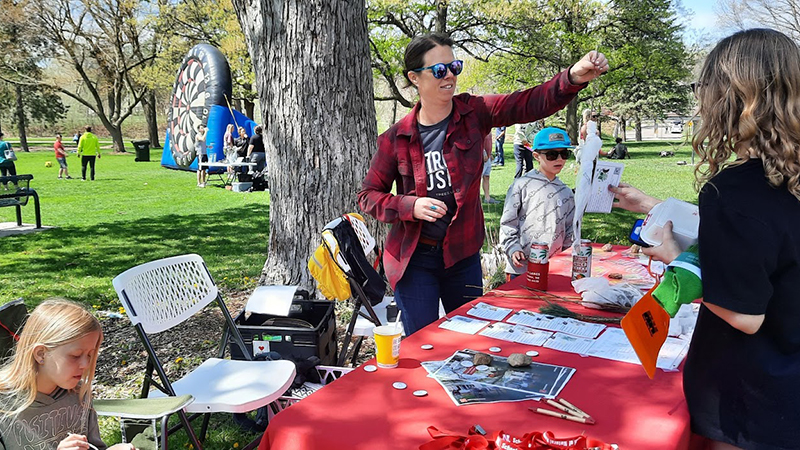
"After those two years of having less than great experiences, I was like, ‘Maybe teaching isn't it?’ People were still not leaving teaching jobs, and I didn't want to do those things anymore. And so, I just went back to Landscape Services,” she said.
She and her husband received their health insurance through her job, they had the two children, and he had started Zipline Brewing Company with others. She said she felt “stuck” in her position.
She began taking graduate classes in the College of Agricultural Sciences and Natural Resources. She applied for and got a research technician position at the Department of Agronomy and Horticulture caring for the Keim Hall courtyard and the Backyard Farmer garden.
She had taken an independent study class with Eric North, and when he left the university to take a position at the University of Minnesota, he recommended her to help with the arboriculture lab.
Although she said she had never thought about teaching college students, she saw how her background in teaching, her current classes, and work climbing trees and using chainsaws had prepared her for the position. She started teaching in January 2021 and began as a lecturer in August 2023. She now has a nine-month appointment and is working on doctoral research in the summer.
"It's been kind of surreal to settle into something and make plans at this job like, 'What are the next things for Regional and Community Forestry?' and digging into that," she said.
She and Lord Ameyaw, a forester and natural resources professor, have started taking undergraduate students on trips to expose them to industry opportunities. In November, they took 10 students to the Tree Care Industry Association exposition in St. Louis.
"The stadium was full of high lifts and chippers and all kinds of fun equipment that forestry uses and urban forestry uses, and they had climbing demonstrations," she said. "It was a really cool expo for the students to see all of the different industries that are a part of this big arboriculture industry."
The students were able to take part in mock job interviews and compete in competitions like knot tying, the throw-back toss, job site setup and trivia knowledge.
In the spring, she now co-leads a study abroad trip to Puerto Rico with professors Dennis Ferraro, Paul Hanson and Becky Young. In the Island Ecology course, Ferraro teaches undergraduates about amphibians and reptiles, Hanson about geology, Young about soil and Powers about plants.
She has also been working with Wyatt Koehler to advise the Forestry Club recently started in the School of Natural Resources. The group meets usually two Fridays a month in the school’s back lawn to climb trees. Any student or university employee can join in the climbs as long as they sign a waiver.
Advising a club has proven a stretch for her.
"I was never involved in clubs when I was an undergrad, so it's hard for me because I don't really know what students expect," she said. "I hated school. I got what I needed to get done, and I left."
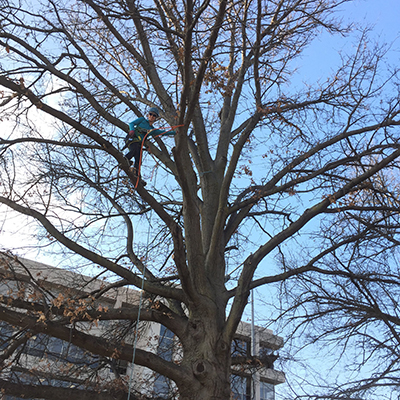
She said teachers never took a personal interest in her as an undergraduate, but she now sees all that the university offers students to support them. She shows interest in her students and strives to give them a good school experience.
"It's been a cool perspective change," she said. "And thinking about how I can reach those students like myself, like, ‘How can I bring you in and really get you to benefit from all the great things this school provides for students?'
"It's incredible seeing it from this perspective and knowing about all of the services and the support that our students get from all kinds of people at the university is pretty neat. From the faculty, to staff, to other students, everybody plays a part. It's pretty neat."
